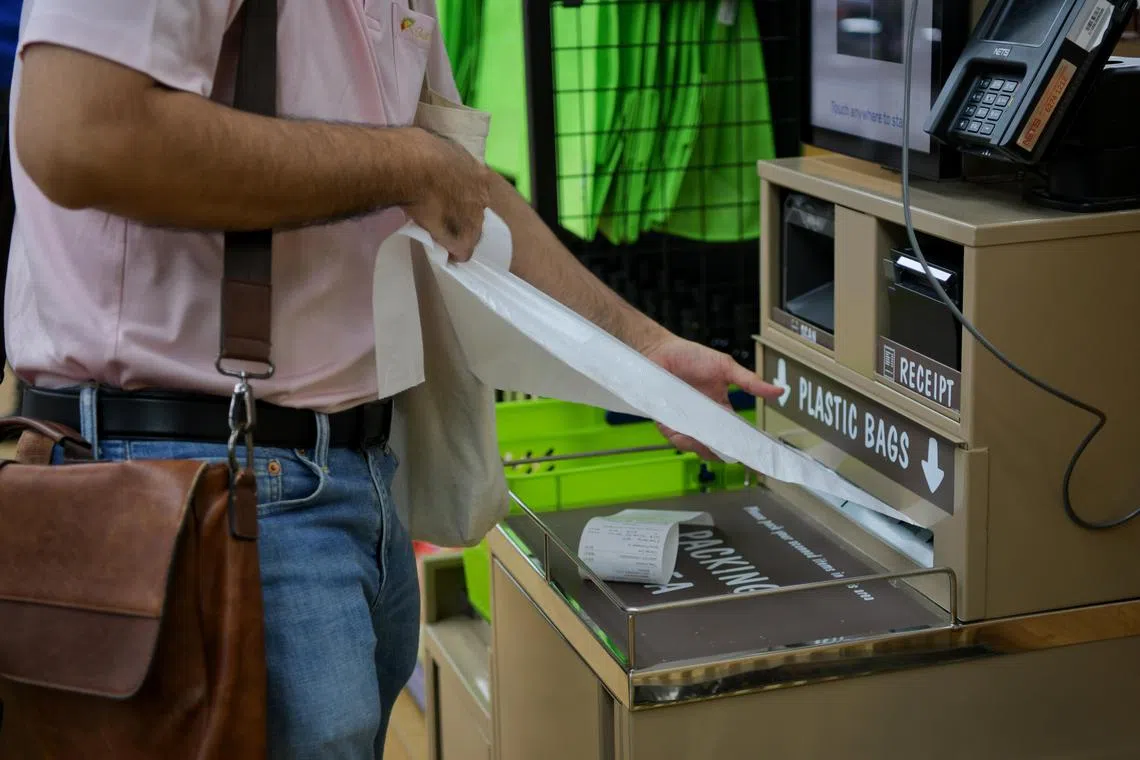Plastic bag use falls by up to 80% at some supermarkets in first month of bag charge
Sign up now: Get ST's newsletters delivered to your inbox

A mandatory charge of at least five cents per disposable bag kicked in at about 400 supermarkets on July 3.
PHOTO: ST FILE
Follow topic:
SINGAPORE – Shoppers took home fewer plastic bags from supermarkets in the first month after they started being charged for them in July, according to the National Environment Agency (NEA).
Preliminary reports from some supermarket operators indicated reductions of 50 per cent to 80 per cent in the number of disposable carrier bags taken, compared with the same period in 2022, NEA said.
A mandatory charge of at least five cents per disposable bag
FairPrice, Sheng Siong and DFI Retail Group – which runs Giant, Cold Storage, CS Fresh, Guardian and 7-Eleven outlets – did not respond to The Straits Times’ requests for details on how bag usage has changed over the past months.
But FairPrice and DFI Retail Group said they have observed an increase in the number of customers with their own reusable bags.
As NEA’s primary objective in implementing the bag charge is to nudge behaviours and encourage people to be more conscious of their consumption of disposables, Associate Professor Md Saidul Islam from the Asian School of the Environment at Nanyang Technological University views the reduction in plastic bag usage as a success, “as it indicates that people are starting to change their habits”.
Since the bag charge started, graphic designer Marcia Mailoa, 38, avoids bagging her purchases at supermarkets. “If I forget to bring a reusable bag, I won’t buy much – I just carry my purchases in my hands.”
She questioned placing the onus on customers by making them pay the bag charge when supermarket operators themselves wrap things unnecessarily in plastic.
“I think I’ve been environmentally aware even before the bag charge, not just about bags, but also other single-use items. But the bag charge has definitely cut down my collection of plastic bags to use to bag trash with,” she said.
Some consumers told ST they have been seeking alternatives to bag their rubbish with.
Ms Sharmine Tan finds that one plastic bag a day for food waste suffices in her household of five, as the rest of the rubbish is sorted for recycling.
Said the 34-year-old: “I’ve tried purchasing plastic bags online. It’s about $3 for 100 pieces, which works out to three cents per bag. This is slightly cheaper than the five-cent charge at supermarkets, but the material is thin and tears easily. The chance of the bag tearing is even higher when it’s thrown down the chute.”
Said Prof Islam: “It’s important to remember that changing behaviours and mindsets takes time, and a reduction in plastic bag usage is a positive sign that people are becoming more environmentally aware.
“To sustain the positive impact of the bag charge, it’s essential that the policy remains effective over time. Regular reviews, enforcement of the policy, and adaptation to changing consumer behaviours are necessary to ensure continued success.”

